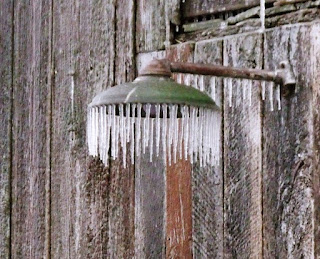The Non-Fertile Separation of Church and Farm
"…and
thus was ever on their lips the countryman’s perpetual lament, so reasonable to
the ear, but which recurs unfailingly: ‘Had it only been an ordinary year!’” –
Louis Hemon (from Maria Chapdelaine, p. 124)
* * *
Harvest has
arrived early this year. The massive - and massively expensive - combines are working
around-the-clock as farmers take to gathering their crops. Where did the summer
go? Soon it will be another eight months of snow and lockdowns.
The
familiar smell of wheat and dust mixed with a deliciously cool freshness -
the usual autumn treasure - seems stale this year. It is not an enjoyable crisp
scent this harvest, but one simply composed of dust and heat. The harvest is a
disaster. The wheat appears half its usual size. The summer drought, which was no
doubt caused by our sins against the climate – at least if you ask a politician,
or Pope Francis - has crushed the spirits of farmers. The heartfelt lament of
the farmer is spoken once again: Had it only been an ordinary year!
The truth
is that farming is no easy task. I do not mean so in the physical sense where,
as you might read in Maria Chapdelaine or Little House on the Prairie,
one toils with a physical and mental vigor which would shame any of us today.
Those days, romantic, natural, and physically bruising, are no more. Rather,
farming has become a pressure-filled business, often requiring a commerce
degree to manage properly. When I say that farming is no easy task, I refer
primarily to what it has become.
The humble
family farm is no longer. Not too long ago in my area a farm went up for sale. After
thirteen generations of family farming the sons, as though belonging to a Wendell
Berry novel, decided they did not want to carry on the tradition. Or maybe they
wished to carry on the tradition, but then realized that a multi-million-dollar
computerized profession had taken over said tradition. The “family farm” had
grown to include a 4000 square-foot house, some 42 quarters of land, and an impressive
830,000-bushel grain handling system. It was put on the open market, and
eventually bought by an entire Hutterite colony for a cool $26.5 million. The
purchase was half-a-million dollars below asking price. What a steal.
This is
farming today. To be honest, it terrifies me. Grain prices, gasoline gouging, and
globalism being what they are, not to mention Justin Trudeau’s crippling carbon
tax in Canada, means that one must attempt to go big or risk shriveling into
the soil. General expenditures are often a half-a-million dollars here, a
half-a-million dollars there. It is not realistic, nor truly human, for that
matter. Even to own a hobby-farm, as my wife and I would love to do, requires one
to win the lottery first. The pleasure of raising pigs or a few head of cattle
sounds wonderful. When the bills start pouring in for land, bales, and fuel,
the warm and fuzzy feelings quickly disappear. What would Pa Ingalls think?
As stated
earlier, this year the harvest is not plenty, despite what is sung at the
cheesy Mass here in town. How will the farmers get through this year? With many
having ditched crop insurance to pay the carbon tax, I imagine some form of
government assistance will be required. It might be enough to weather another
year. The banks might come calling for a few farms, but overall life will carry
on as before.
I cannot
help but wonder what the Church has to say in all of this? Surely it must
matter, for the noble occupation of farming had a special place in Christ’s
heart. Mark 4 does not say, “The occupational therapist went out to offer
occupational therapy…”, but rather, “Behold, the sower went out to sow.” Unfortunately,
my personal observation is that the Church and the farmer are currently not at
peace with one another.
Attend a
weekend Mass in a typical rural town and this is what you will observe. There
will be multiple prayers offered for a good harvest, for safety of the farmers,
and for good weather. At least one or more of the many “homilies” will include
chitchat about the state of the fields, and what the most recent weather
forecast is predicting. And, of course, crops and produce will be showcased in
front of the altar, paradoxically evoking Cain’s unworthy offering. To all of
this you may see a few farmer wives nodding or blushing from the attention. Meanwhile,
their husbands will be out in the fields working. For them God will have to
wait a few more Sundays; there is mammon at stake.
This
seems the height of what the modern Church has to offer farmers. It is little
more than a slap on the back, and a kind word of appreciation. “Good luck! Keep
us warm and well-fed, dear farmers. Hope to see you once harvest is completed!”
Perhaps it is all heartfelt. But it is all mostly unhelpful. Farmers have souls
too. They need to hear some difficult truths, and then they need a strong and
grace-filled Church to back them up.
First, the
difficult truth. I will be blunt: Despite having attended hundreds of Masses in
rural farming communities, I have never once heard a priest utter a single word
about the obligation to attend Mass on Sunday, much less to not work on this
day. Not once. I am not sure if priests are afraid of the backlash they might
receive from a tired farmer, or if the priests truly believe that all farm work
is necessary on Sunday.
We all
know of the great St. Jean Marie Vianney’s position on the matter. “If we ask
those who work on Sunday, ‘What have you been doing?’ they might answer: ‘I
have been selling my soul to the devil and crucifying our Lord…’” (The Curé d’Ars p. 135).
Vianney was strict. Perhaps some might argue he was too strict: “Yes, elsewhere
priests may grant permission to work on Sunday; I, at Ars, cannot do so” (p.
137). However, what we have is the total reversal of Vianney’s holy demands.
Now, missing Mass on Sunday is the implicit position for many farmers, as
though any sacrifice of inconvenience in the matter is too burdensome. To which
I ponder: How can we ask God’s blessings on the fields if we cannot even attempt
to honor His very Commandments? It is hypocritical.
Though I
sadly begrudge the demands placed on farmers to grow their business, what is
needed is a slight scale back in operations. One-seventh of their time and
efforts must be sacrificed; one-seventh being the time for the Lord’s Day. Yes,
it may require significant sacrifice to carry out, yet it may also merit fruitful
blessings.
I plea
for the Church to preach to farmers what is difficult. I also plea in turn for
the Church to buttress these demands with true and effective assistance. Fortunately,
there is an established way to do this.
When I
first went to university, I started attending the traditional Latin Mass. One
day after Mass a lady pulled me off to the side and, in a hushed manner, said
she had something that might interest me. Out of her purse came a brown
envelope. I half-imagined her attempting to complete a drug deal at the back of
the church. It was in a rough part of town, after all.
“I’ve got
something I think you’d like to try,” she carried on, sniffling as she pulled a
pamphlet from the brown envelope. “It’s called… rogation days. The
main day is on St. Mark’s feast day. We offer prayers and fasting to God
and ask that the crops be protected from natural disasters and…” Her voice
trailed off as she noticed me turning pale.
“Um. I’ll
think about it,” was all I could muster. I half-wished she had tried to offer
me cocaine. It is easy to decline taking drugs. But to shy away from prayer and
fasting? What a pathetic young man! In fairness to me, however, these rogation
days sounded… difficult.
Rogation days are supposed to be difficult. Yet, if the Church must ask farmers to do what is difficult and give due honor to Sunday, the Church must also ask what is difficult of all its members. For the love of farmers, their work, and their souls, we need a full return to rogation days. In a word, we need less trust in government bailouts, and more faith in almighty God. The farm and the Church must not be separate.
Such are my thoughts as I drive past a field being worked on by no fewer than six towering combines, desperately scavenging for sustenance. No, it is not an ordinary harvest. But in these godless times, we must hope for more than what is ordinary. A simple solution awaits our efforts. Let us instill in the farmers a slight reprieve from their many toils. One-seventh is needed. And with that, may millions of Catholics in the Church requite for the one-seventh with an abundance of prayer and fasting.
Perhaps then the harvest will be plentiful.







Comments
Post a Comment